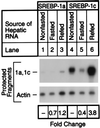Regulation of sterol regulatory element binding proteins in livers of fasted and refed mice
- PMID: 9600904
- PMCID: PMC27572
- DOI: 10.1073/pnas.95.11.5987
Regulation of sterol regulatory element binding proteins in livers of fasted and refed mice
Abstract
Hepatic lipid synthesis is known to be regulated by food consumption. In rodents fasting decreases the synthesis of cholesterol as well as fatty acids. Refeeding a high carbohydrate/low fat diet enhances fatty acid synthesis by 5- to 20-fold above the fed state, whereas cholesterol synthesis returns only to the prefasted level. Sterol regulatory element binding proteins (SREBPs) are transcription factors that regulate genes involved in cholesterol and fatty acid synthesis. Here, we show that fasting markedly reduces the amounts of SREBP-1 and -2 in mouse liver nuclei, with corresponding decreases in the mRNAs for SREBP-activated target genes. Refeeding a high carbohydrate/low fat diet resulted in a 4- to 5-fold increase of nuclear SREBP-1 above nonfasted levels, whereas nuclear SREBP-2 protein returned only to the nonfasted level. The hepatic mRNAs for fatty acid biosynthetic enzymes increased 5- to 10-fold above nonfasted levels, a pattern that paralleled the changes in nuclear SREBP-1. The hepatic mRNAs for enzymes involved in cholesterol synthesis returned to the nonfasted level, closely following the pattern of nuclear SREBP-2 regulation. Transgenic mice that overproduce nuclear SREBP-1c failed to show the normal decrease in hepatic mRNA levels for cholesterol and fatty acid synthetic enzymes upon fasting. We conclude that SREBPs are regulated by food consumption in the mouse liver and that the decline in nuclear SREBP-1c upon fasting may explain in part the decrease in mRNAs encoding enzymes of the fatty acid biosynthetic pathway.
Figures






References
Publication types
MeSH terms
Substances
Grants and funding
LinkOut - more resources
Full Text Sources
Other Literature Sources
Medical

